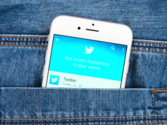-
About
- About Listly
- Community & Support
- Howto
- Chrome Extension
- Bookmarklet
- WordPress Plugin
- Listly Premium
- Privacy
- Terms
- DMCA Copyright
- © 2010-2025 Boomy Labs


Why are marketers so excited about the possibility of tracking dark social traffic? Not only is it the quantity of traffic found on dark social channels, but also the quality of traffic there.
Everyone seems to be talking about dark social these days. The term, coined by Alexis Madrigal of The Atlantic, refers to social traffic from previously untrackable sources, such as links shared via emails, messaging apps, and some mobile applications. This is opposed to traffic from open social platforms - Facebook, LinkedIn, Twitter, etc. - which is easily tracked.
Why all the excitement? For one thing, dark social traffic is estimated to be three times larger, by volume, than standard social media traffic. If that seems hard to believe, just think about how often your friends and relatives send you links over email. But it’s the quality of dark social traffic as much as the quantity that has so many marketers paying close attention.
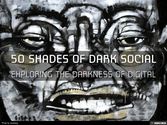
Dark Social is an interesting concept. I researched it here http://list.ly/list/Xno-dark-social-research-into-the-digital-underbelly I explore the dark side of...

Dark Social Definition - Dark social is a term coined by Alexis C. Madrigal, a senior editor at The Atlantic, to refer to the social sharing of...
![What Is Dark Social? [FAQs] @gsosk / @hubspot](http://media.list.ly/production/129940/983791/item983791_185px.jpeg?ver=7434106787)
The last time you wanted to send your coworker a hilarious article, how did you do it? Tweet at them? Post it on their Facebook wall? Probably not ... their cube is literally two feet away from yours. I'd venture a guess you IMed or emailed it to them -- or maybe even asked them to walk over to your screen.

Here's a pocket history of the web, according to many people. In the early days, the web was just pages of information linked to each other. Then along came web crawlers that helped you find what you wanted among all that information.
![Dark Social: The Dominant Force In Online Sharing [Infographic] @StatistaCharts](http://media.list.ly/production/129940/983793/item983793_185px.jpeg?ver=3512529018)
A recent report from Radium One shed some light on the concept of "Dark Social", the dominant but seldom discussed force in online sharing. This term was coined back in 2012 but what does it actually mean? Radium One defines it as "social sharing that occurs in private digital communication tools [...]

So-called "dark social" accounts for twice the sharing that occurs on Facebook, and 91 percent of us use it regularly. Apparently, email's not dead. That's according to a new 9,000-consumer study commissioned by RadiumOne: The Light and Dark of Social Sharing.
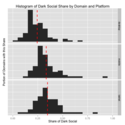
Here at Chartbeat, we have a long history of trying to shed light on the sources of your traffic. Since 2012, we've helped illuminate the phenomenon known as dark social-where traffic is likely to come from social sources, yet lacks explicit referrer attribution. Two years later, Internet traffic looks a lot different than it previously did.

About two years ago, I wrote a story about a strange phenomenon on the web: in a medium known for its ability to track people-following them around with Zappo's ads and such-it turns out that websites don't know where a substantial percentage of their visitors come from.

We're increasingly familiar with the "dark web" through technology like Tor, but how about "dark social" - sharing that happens outside trackable social networks like Facebook and Twitter?

With approximately 2bn users between them, it would be easy to forgive people for believing that most sharing happens on social platforms such as Facebook and Twitter. But they are wrong. Very wrong, in fact. The majority of sharing happens in what has been dubbed " dark social", the silent but active underbelly of the web.

This post was originally published on relevance.com | An excellent Blog you should subscribe to! (seriously, it's one of my favorite publishers in things digital marketing & content marketing) In late 2012, Alexis Madrigal, senior editor at The Atlantic, published an article titled " Dark Social: We have the whole history of the web wrong."

Written by an actual teen I read technology articles quite often and see plenty of authors attempt to dissect or describe the teenage audience, especially in regards to social media. However, I have yet to see a teenager contribute their voice to this discussion. This is where I would like to provide my own humble opinion.
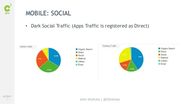
Mobile is the platform to on be right now. According to this HBR.org article, the number of users across all demographics that use their phone or tablet more than a laptop or desktop is only set to rise. Apple made over FOUR BILLION DOLLARS in 2014 from the App store.
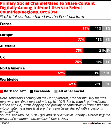
We've all heard about "in the light" sharing on social platforms, but dark social-when people copy and paste content or links and send it to their contacts in a private message-matters just as much, if not more. Over 90% of internet users who share content online do so via dark social, which accounts for nearly 70% of content shares globally.

Despite the fact that our ability to track and measure almost every aspect of user traffic has never been stronger, there has been a strange gap in our knowledge for some time - a phenomenon that Alexis Madrigal, then with The Atlantic, referred to a couple of years ago as "dark social."
